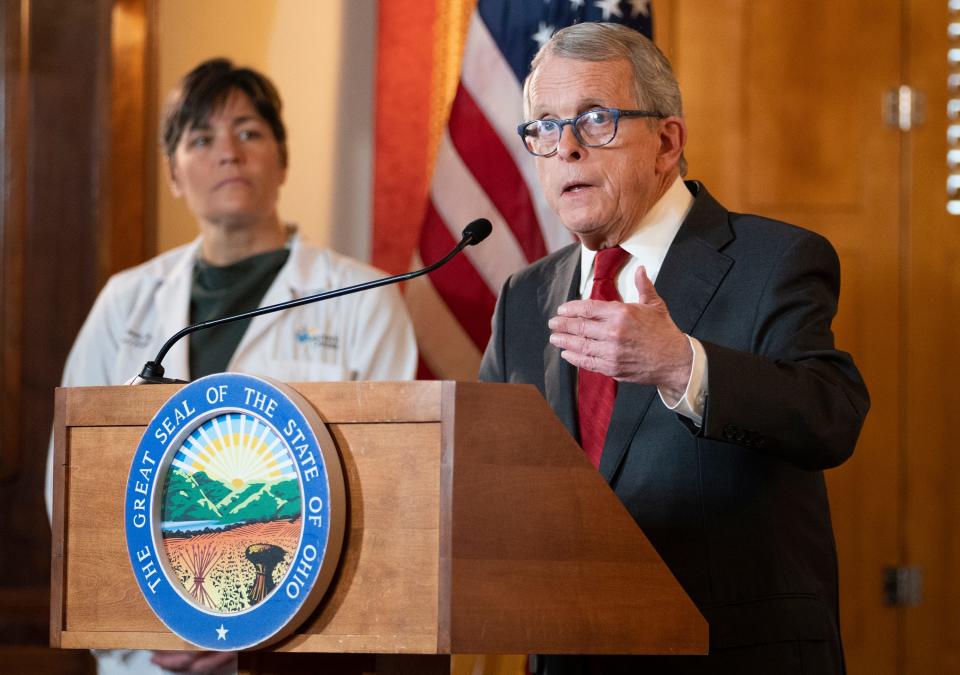Judge temporarily halts Ohio law to keep Columbus, other cities from regulating tobacco
A Franklin County judge issued a temporary restraining order late Friday afternoon, stopping a state law from taking effect next week that would prevent Columbus, several Franklin County suburbs, Cincinnati and other Ohio cities from regulating tobacco products.
The ruling means the local cities' bans on the sale of flavored tobacco products will remain in effect for now but indicates that Franklin County Common Pleas Judge Mark Serrott believes the cities' case is likely to succeed.
Serrott scheduled a preliminary injunction hearing in the case for May 17.
Columbus, Cincinnati and several other Ohio cities filed a lawsuit Tuesday challenging the law created by the Republican-controlled Ohio General Assembly, arguing the legislature violated an Ohio constitutional amendment giving cities "home rule" to set their own laws for the good of their residents on certain matters, including on issues of public safety. The cities argue the new Ohio law allowing flavored tobacco sales negatively affects the health of Ohioans, particularly of teens increasingly turning to vaping.
After a 50-minute hearing Friday in downtown Columbus, Serrott left the courtroom for about half an hour before returning with a decision. He explained that the state law effectively pre-empting municipalities from regulating tobacco locally appeared to be missing key elements, such as a comprehensive state regulation scheme, which appears to infringe on cities' rights under the Ohio Constitution.
"Basically all (the state law) does is say 'We are pre-empting the municipalities' ability to regulate," Serrott said, adding that the Ohio Supreme Court has ruled that for "general laws" to be valid, they are supposed to "prescribe conduct by citizens," not by cities, which are granted special regulatory rights under the state constitution.
Serrott also noted that while one state law prohibits municipalities from regulating tobacco, another one requires a plan a to reduce tobacco use by Ohioans. That code emphasizes reducing the use of tobacco by "youth, minority and regional populations, pregnant women, medicaid recipients, and others who may be disproportionately affected by the use of tobacco."
In granting the restraining order, Serrott concluded the cities' challenge to the constitutionality of the state law is likely to ultimately succeed — although he also acknowledged his final ruling will likely be appealed.
Serrott found not granting the restraining order would cause harm because of future health consequences to juveniles targeted by tobacco distributors.
"It's fortunate that he sided with us temporarily," said Columbus City Attorney Zach Klein, while leaving the courtroom. "And really this is a win for kids, which is the whole focus of this. How can we get … flavored tobacco products and vaping... How can we get that out of the hands of children?"
Klein said the state had really "overstepped their bounds" in trying to keep local governments from protecting kids.
"The intent was just to get the cities out of the business, not for the state to step in and do something different. And that cuts right at the heart of what home rule is," Klein said, adding the state law also kept Columbus Public Health from checking whether stores would illegally sell tobacco to minors.
Jonathan Secrest, an attorney with the Dickinson Wright law firm in Columbus who is representing the state, said the state law will go into effect everywhere in Ohio next week except the municipalities that are parties to the case.
Besides Columbus, Cincinnati and Cleveland, that includes the suburban Franklin County cities of Bexley, Dublin, Gahanna, Grandview Heights, Hilliard, Reynoldsburg, Upper Arlington, Whitehall and Worthington, The Dispatch previously reported.

Gov. Mike DeWine twice vetoed the state legislature's efforts to prohibit cities from enacting bans on flavored tobacco products, saying at one point: “When a local community wants to make the decision to ban these flavors to protect their children, we should applaud those decisions."
But lawmakers voted to override his veto, restoring the law. State lawmakers have argued that they, not local governments, should have broad controls to keep the law uniform statewide, such as penalizing merchants selling tobacco products to those under 21, and that the ban also hurts small businesses that rely on such sales.
Klein, DeWine and other proponents of the city bans have argued that flavored tobacco and e-cigarettes, or vapes, have led to a sharp rise in nicotine use among teens — wiping out decades of efforts to put anti-smoking laws into place — and that those products have historically targeted minorities and low-income people.
Central Ohio mayors blasted state lawmakers earlier this year when they finally achieved passing the law over DeWine's veto.
"The statehouse arbitrarily decided that, for the first time in Ohio history, local communities shouldn't have the ability to decide what's best for the health of our communities," said Bexley Mayor Ben Kessler in a written statement to The Dispatch in January. "Local laws around nicotine regulation are not new, and until now local authority has never been questioned in this arena."
Kessler charged that lawmakers were siding with tobacco companies planning "to lure our teenagers and children into addiction."
Dispatch reporter Shahid Meighan contributed to this report.
@ReporterBush
This article originally appeared on The Columbus Dispatch: Ohio state law regulating flavored tobacco put on hold in some cities

